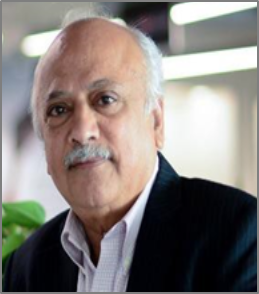Reactions to Interim Budget - 2024

"Clearly, the FM is exuding confidence that this Govt will return to power and her statement is a thrust of how the Govt will ensure unprecedented growth over the next five years."

This article has been co-authored by Mr. Shankey Agrawal, Partner, BMR Legal
"The Interim Budget 2024, in an unsurprisingly straight manner, proposes nominal tax legislations and rate changes. It, however, lays down the vision for the next Government while retaining focus on infrastructure development, women empowerment, youth, generation of employment opportunities, financial inclusivity, and promotion of new technologies.
Although the tax rates remain unchanged, barring reduction in the scope of TCS rate for the Liberal Remittance Scheme (LRS) and a few procedural-related extensions on the direct tax front. To incentivise startups and IFSC units and investments by sovereign wealth or pension funds, the benefit of exemption, which was expiring on March 31, 2024, has been extended for another year. There has been a great emphasis on the improvement of taxpayer services by withdrawing outstanding small direct tax demands up to a certain monetary threshold. The Government’s initiative has led to better provision of taxpayer services, which includes the introduction of a faceless assessment and appeal mechanism, updated Income tax returns, Form 26AS and a mechanism for pre-filing of tax returns. These services combined have led to the processing of tax returns at a quicker pace from 93 days in FY 2013-14 to 10 days in the current year.
On the trade front, the Government has signalled to unveil its policy to negotiate Bilateral Investment Treaties and enhance its treaty network. Additionally, the India-Middle East-Europe Economic Corridor has been indicated to be a pivotal Government has laid emphasis on economic management for unprecedented development in the next five years to achieve a developed India by 2047."
Views are personal

"With most of the corporate tax reforms – reduction in corporate tax rates, phasing out of most incentives, rationalisation of dividend taxation – already implemented, and with robust tax collections, the Finance Minister was not expected to introduce any significant tax changes in the Interim Budget 2024. However, Corporate India may perhaps have expected an announcement on India’s path for implementing the OECD’s Global Minimum Tax (GMT) proposals. As several jurisdictions move to adopt the Global Anti-Base Erosion (GloBE) rules, the benefit of limiting tax competition and the expectation that such rules could generate additional tax revenues across the world cannot be over-emphasized. However, it has become imperative to note that the rules, by design, will impact countries differently depending on whether a country is developed or developing, a source or resident jurisdiction.
The OECD’s GMT of 15% has meant that developing countries need to consider what policy responses to take to ensure they collect the minimum tax and not cede it to developed countries. One of the main challenges or concerns of developing countries is the mind boggling complexity of the model rules developed by the OECD. In view of the complex nature of the rules and the low capacities in developing countries, it is doubtful whether such countries (including India) will truly benefit from the process. Structurally, the nature of the rules makes it difficult for them to be included into the existing legal framework of many countries by way of amendment. Furthermore, for such complex rules, implementation and compliance will always be difficult. This will impose a high cost of implementation, particularly on the tax administration. While the need for clarity is important, it is welcome to note that the Government does not intend to rush through the implementation of the rules without undertaking an impact assessment."

On amendment in Sec. 206C, "Yes preliminary reading indicates that whatever was announced through press release last year in June has been incorporated in the law.
Write off of old demand (pre2010) up to Rs 25,000 is a major step to clean the books. There are many such cases where such demand is not supported by papers. This is expected to help a large number of taxpayers."

"No changes in tax rates. Withdrawal of demand upto 25000 till Financial Year 2009-10 and upto 10000 from Financial Year 2010-11 is a welcome step. While the government is not introducing any amendments as it an Interim budget there is a hope that long pending demand on disposal of appeals and litigation management and rationalsing TDS will be taken up. The Government is more focussed on Infra creation and Infra sustenance as it would help the country to grow. The GOI also appears to popularise Gift City and extending the tax holiday is on the direction. The Government is supremely confident that it would be back after 2024 elections and push more reforms to make sure that India is on a growth trajectory."

The Interim Budget 2024 continues the Government’s visionary and positive approach with emphasis on the mantra of ‘Sabka Saath, Sabka Vikas, Sabka Vishwas’ duly aided by Sabka Prayas. Multiple initiatives centered around Women, Youth, Farmers and Poor have been announced. The fiscal deficit target being reduced to 5.1% for next year and the 11.1% increase in capital expenditure show that the Government borrowings are being kept under control and are proposed to be used towards infrastructure development in the country with interesting initiatives like Rooftop Solarisation, 3 major railway economic corridor programmes and green energy related programmes.
With no alterations in the existing tax rates proposed for direct and indirect taxes including import duties, the Government has kept the changes minimal on the tax front. Certain tax benefits given to Start-ups, Sovereign Wealth and Pension funds and IFSC units, earlier expiring on 31 March 2024 have been extended by a year (the concessional tax rate of 15% available for new manufacturing domestic concerns commencing manufacturing or production by 31 March 2024 has not been extended however). The changes proposed in TCS provisions are giving legislative backing to the changes already notified earlier by the CBDT.
The Finance Minister has further proposed to benefit around 1 Crore taxpayers by withdrawing the outstanding direct tax demands upto INR 25,000 for the period upto FY 2009-10 and tax demands upto INR 10,000 for FY 2010-11 to FY 2014-15. The Scheme in this regard is awaited to verify whether the amounts include interest as well.
Expectations around introduction of provisions enabling BEPS Pillar 2 related changes, TDS rate rationalisation and Capital Gains tax law rationalisation will now need to await the full Budget post elections.
Overall the interim Budget stays true to the spirit of not introducing any major changes and continues the Government’s confident march towards achieving its vision of Viksit Bharat (Prosperous Bharat) by 2047.

Budget 2024 Echoes of Unstoppable India in the New Parliament Building
"Standing in the freshly inaugurated Parliament building and delivering her sixth consecutive Union Budget, Hon’ble FM, Smt. Nirmala Sitharaman, resounded the development-mantra of “Sabka Saath, Sabka Vikas, Sabka Vishwas”, strongly underpinning her Government’s pointed-resolve for inclusive growth. She re-coined the acronym ‘GDP’ as symbolizing 'Governance, Development and Performance’, and re-emphasized that India’s undeniable ‘Amrit Kaal’ (Golden-era) was going to bear the fruits of the ongoing ‘Kartavya Kaal’ (Action-time) strongly set into motion by her Government.
Hon’ble FM underlined the focus-groups of her Government as GARIB (Garib Kalyan, Desh-ka-Kalyan), YOUTH (Empowering-the-Youth), ANNADATA (Welfare-of-Farmers) and WOMEN (Nari-Shakti).
Taking cue from Hon’ble Prime Minister’s slogan of “Jai Anusandhan” (Victory-to-Innovation), FM emphatically announced establishment of a corpus of INR 1 lakh crore for providing long-term financing to “tech-savvy youth” perpetually hungry for low-interest capital to fund their ambitious R&D needs.
Betting on a growth-trajectory of appx. 7% increase in GDP, and surging desire among foreign investors to enter lucrative Indian markets, she alluded that India is now confidently poised than ever before to reconsider bilateral investment treaties seeking “Foreign Direct Investment” on the prioritized-principle of “First Develop India”.
On the tax front, whether direct or indirect, no changes in law, rate or duty-structure have been proposed. Status quo has been maintained, as is usually expected from a ‘Vote-on-Account’. However, on the fringes, marginal extensions by an additional year (i.e. commencement up until March 31, 2025) are proposed in respect of sun-set clauses as they apply to certain specified-units commencing operations in the GIFT city, and also in relation to incorporation of companies qualifying as eligible start-ups. TCS provisions have been tweaked. In a gesture of generosity, it has been proposed that the Government will write-off arrears of income-tax upto a ceiling-limit of INR 10,000 or INR 25,000 pertaining to specified historical assessment years, which would potentially allow relief and bury litigation across 10 million small taxpayers.
Overall, the mood of the Government sounded confident and upbeat. India’s growth-story is turning out to be real."

"The Indian economy has witnessed positive transformation and still focused on Fiscal consolidation, substantial tax reforms and strengthening economy with its mantra of ‘Sabka Saath, Sabka Vikas and `Sabka Vishwas’ stepped into election year. The focus is on development needs for poor, women, youth and farmers.
This is the last Budget before national elections and with low expectation of major tax reforms or changes in tax rates, the Finance Minister in her Interim Budget 2024-25 shared growth study of Indian economy.
The Finance Minister has kept a focus on managing fiscal deficit even in the year of elections. The fiscal deficit is proposed at 5.1% of GDP in FY 2024-25 with a further reduction to 4.5% of GDP in FY 2025-26. There is a clear path to fiscal consolidation and that the Government in committed to growth of the economy.
The Finance Minister appreciated continuous support of taxpayers to file tax returns which was multifold 4 times in last year. The Direct tax revenue has doubled as compared to 2022-23.
Having said that there were some deadlines for tax incentives / benefits which were expiring on march 31, 2024 and the same were important to extend are highlighted hereunder -
Extension of Sunset clauses for IFSC units
The Finance Bill, 2024 has extended sunset clause for Investment division of Offshore banking unit set up in an International Financial Services Centre (‘IFSC’) and any offshore banking unit registered as FPI. Further, it has covered unit set up and commenced operations in leading of aircraft leasing and income earned by non-residents in the form of royalty or interest. The date has been extended by one more year to March 31, 2025.
Incentives for start-ups: Counting post pandemic era and businesses growing steadily, to boost business promotion for eligible start-ups, the period of incorporation for eligibility of tax holiday has been extended for units incorporated upto March 31, 2025.
The deadline for commencement of production has not been extended for new manufacturing companies u/s 115BAB.
Tax collection at source –
The CBDT’s circular of Circular No. 10/2023 dated June 30, 2023 has been proposed to be implemented in section 206C(1G) wherein the rate of 20% is substituted for a person remitting amount under Liberalized Remittance Scheme of the Reserve Bank of India and to a seller of overseas tour program package in excess of seven lakh rupees in a financial year.
Others: Time limit for introducing faceless scheme by Central Government for Transfer Pricing proceedings, DRP Proceedings and ITAT Proceedings is proposed to be extended upto March 31, 2025.
In alignment with our government’s vision to improve ease of living and ease of doing business, a proposal to write off of small tax demands of past is a good step towards reducing needless tax litigation and will benefit about a crore tax payers.
Overall, no major change in the tax is good. The tax policies are stable and predictable and will increase confidence of investor community."

"This being an interim budget not many amendments were expected. But it is quite surprising that no change in the tax rates have been made considering upcoming elections. Even the sunset date for availing lower rate of 15% by a new manufacturing company has not been extended. Sunset clause for start ups and IFSC have only been extended.
Overall looking at the budget, it is an inclusive budget focusing on all the major sectors of economy including agriculture, infrastructure, environmental protection, employment creation, FDI etc. As per the Prime Minister, the budget has focused on the four major castes - Poor, Women, Youth and Farmer. The flavour of the Budget has been focus on Atmanirbhar Bharat and Make In India Initiatives.
The major focus area has been green energy and commitment to net zero emissions. Introducing rooftop solarization project will go a long way to reduce the burden of distribution companies, on coal and other minerals and also making uninterrupted electricity available to individuals. This shall also lead to generation of employment opportunities for youth. A win-win for all. Further, announcements have also been made for expansion of the e vehicle ecosystem by supporting manufacturing and charging infrastructure use of biofuels etc.
India is in need of funds to invest in infrastructure development. This is an important area as it directly impacts fiscal decifit. For encouraging sustained foreign investment, the Government is negotiating bilateral investment treaties, in the spirit of ‘first develop India’. Funds have been allocated to loan at low costs to tech savy youth encouraging the start up culture.
While there have been no announcements or changes in taxes, the overall policy announcements are in line with all-round, all-pervasive and all-inclusive, and aiming to make India a Vikasit Bharat by 2047."

Prudence in continuity or a missed opportunity?
As per convention, the main tax proposals are presented in the regular budget. Yet the interim budget presentation had raised expectations of some reliefs in the light of a limping global economy that would have provided a boost to international trade, both inbound and outbound. However, the tax proposals do not propose any changes relating to taxation and retains the same tax rates for (direct and) indirect taxes including import duties. Certain changes to boost domestic manufacture such as change in applicable BCD rate on specified parts/sub-parts of cellular mobile phone have, no doubt, been introduced ahead of the budget.
One of the two changes that have been proposed in GST regime, namely that of Input Service Distributor, was anticipated to make registration as Input Service Distributor mandatory in cases of procurement of common input services and distribution thereof to distinct persons, in view of the controversy surrounding the issue and the 17 th July 2023 CBIC circular. However, the wording “receives tax invoices towards the receipt of input services……. for and on behalf of distinct persons” proposed in the amendment is going to restrict the scope of Input Service Distributor and may even cause some amount of litigation. A clarification of the scope of the amendment would be welcome.

"Being an interim budget, only few changes were expected, especially since customs rate changes for parts of mobile phones were carried out couple of days ago.
Trends in GST collection is encouraging as the Finance Minister mentioned that gross average monthly collections are at all time high of 1.66 lakh crore in this fiscal (this was 1.51 lakh crore in FY 23) and it looks that we are set to cross 20 lakh crore mark for the first time. Therefore, the target for FY 25 (increase of around 11.6%) looks quite reasonable.
One important proposed change is in the definition of Input Service Distributor (ISD) thereby giving to effect to the GST council’s recommendation to make ISD mechanism mandatory and providing clarity within the GST laws regarding routing of input service invoices to various locations of same legal entity. Businesses will have to carefully evaluate their current processes and make necessary changes in order to comply with the proposed change."

“The Budget maintains it’s emphasis on strong, sustainable and inclusive growth towards Viksit Bharat by 2047. Aligned to the general expectations, no major announcements were made with majorly steering of existing policies continuing. Per se there were no major changes announced from an indirect tax standpoint either. One proposal impacting most businesses was aligned to the recent GST Council’s recommendation for making ISD mandatory. While enabling provisions have been proposed, detailed guidelines on mechanism are expected to follow with possibly certain modifications being proposed. With distribution mechanism soon possibly being made mandatory, businesses would need to align their processes, technology, billing locations, vendor communications and expense tracking to ensure compliance with this mandated obligation."

"In line with long-lived tradition, the Interim Budget for FY 2024-25 was a no-shocker and proposed no key policy changes. Being present government’s last Finance Budget prior to conduct of general elections, the Finance Minister Nirmala Sitharaman’s speech largely focused on highlights of the decade gone by. In furtherance of the government’s focus on “Amrit Kaal” and its promise to make India a developed country by 2047, the Finance Minister emphasized upon key announcements made in past five to ten years in various sectors such as defense, infrastructure, agriculture, education and employment that are critical for overall development of country. On legal and tax front, increase in revenue collections and deepening as well as widening of tax base was the front runner.
The only significant change introduced in the Indirect Taxes aims to cure a chronic itch, dispute around mandatory applicability of Input Service Distributor (ISD) mechanism. Having travelled the domain of multiple GST Council Meetings, Draft Circular and multiple Advance Rulings, department conceded its stand for past period by issuing favorable Circular and had proposed to make amendments in law itself. Considering multiple disputes around similar mechanism under service tax regime, taxpayers are set to undergo fresh discussions on account of substitution of key provisions on this aspect. While this proposal apparently seems to be only about change in method of distributing common credit from cross charge to ISD, the amendment will trigger changes in IT and business processes, which are often strenuous to implement for larger organizations. Other than this, no other significant tax measures seemed to be on the Finance Minister’s plate.
The Interim Budget has strategically avoided any discussion on several key issues, like much anticipated Customs Amnesty Scheme, new SEZ Law (DESH Bill) and GST on Ethyl Neutral Alcohol, amongst others. It would be interesting to see the turn of events post conduct of general elections."

“The recent changes in TCS on LRS remittances and foreign tour packages announced in various press releases, have been incorporated in Legislative section 206C(1G), through amendments in the existing language of this section. There is No reduction from 20% to 5%.
The time limit for incorporation of Faceless Scheme for Incometax Appellate Tribunals has been extended for one more year till 31.3.2025.
Further, the threshold time limit for the benefit of reduced corporate tax rate u/s 115BAB, in case manufacturing Companies expiring on 31.3.204, has not been extended. Time limit for tax incentives for units in IFSC and certain Sovereign Welfare and Pension Funds have been extended for one more year till 31.3.2025."

"This Interim budget 2024 , is Naya Kal Chakra - Ram Rajya Ka First Budget may not be a game-changer, however it offers insights into the country's financial health and future priorities. For businesses and individuals, understanding its focus is crucial for strategic planning.
However following Expectations from Budget 2024 are not fulfilled:
Relaxation in ESOP taxation: Startups have been rewarding employees with ESOPs to nudge them to join startups. It is expected that a lot of startups will go public this year. Accordingly, it would help startups if government makes ESOP taxation rules employee friendly. Further, this move help generate more employment in startups.
Increase in limit of home loan interest: As of now, the maximum deduction for interest repayment on a loan taken to acquire a property(self-occupied) is Rs 2,00,000. This, however, limits the prospective buyer’s ability to acquire a property. In most cities, the price of property has gone up significantly, and consequently, interest payments on home loans have also increased. So, the limit of Rs 2,00,000 needs to be looked upon.
Allowing home loan interest under the new tax regime: Under the new tax regime, the interest paid on a home loan on rented-out property is allowed; however, the same is not allowed for the self-occupied property. To encourage home buyers, the inclusion of home loan interest repayment in the new tax regime is expected. Further, it may improve the acceptability of the new tax regime.
Increase the limit of 80D deduction: Increase the limit of Sec 80D from 25,000 to 50,000 for normal persons and 50,000 to 75,000 for senior citizens as the premium amount periodically increases.
Inclusion of 80D in the new tax regime: Since medical insurance is the need of the hour, allowing medical insurance premiums paid as a deduction under the new tax regime shall increase the coverage and improve the acceptability of the new tax regime .
On the Indirect tax front:
Option to revise GST returns: Errors in filed returns can only be rectified in subsequent return periods. We expect a revision of returns to be allowed; that’ll be a win-win for taxpayers and the department, as this will help reduce the number of notices and intimations manifold. GSTN is working towards this, and we can know its dynamics once the government releases APIs.
e-Invoicing for B2C transactions: Extending this requirement to B2C transactions would further reduce tax evasion and ensure better compliance. However, this would also mean increased compliance burdens for businesses, especially smaller ones, which may require technological upgrades to adhere to these requirements.
Overall, the Interim Budget 2024 , Naya Kal Chakra - Ram Rajya Ka First Budget outlines a roadmap for "Vikasit Bharat 2047," emphasizing GYAN (Garib, Youth, Anandata, Nari) and promoting Sabka Ka Sath, Sabka Vikas, Sabka Vishwas, Sabka Prayas. The mission is to achieve a Developed India by 2047."


"As expected, there were no significant announcements under Indirect Tax from the Interim Budget. The only amendments proposed were to give effect to the previous decision taken in the GST Council relating to ISD mechanism and to propose additional penalty for Pan Masala and Tobacco products. The industry was hopeful that there may be few announcements with respect to amnesty schemes for long pending Customs disputes, however, being an Interim budget, the government did not get into any significant measures under Indirect Taxes. The Hon’ble Finance Minister remarked that the introduction of GST has resulted in widening of tax base, reduction in compliance burden and buoyant tax collections month after month. While GST is a positive tax reform, we still have some way to go towards simplification of tax compliances, time consuming audits and assessments."

"The Interim Budget 2024 promises unprecedented development and golden moments to realise the dream of developed India by 2047. Showing the promising Revised Estimates, total receipts other than borrowing is 27.56 Lakh Crore Rupees and total expenditure is 44.90 lakh crore rupees. The Revenue Receipts at 30.03 lakh crore rupees are expected to be higher than the budget estimate reflecting strong growth momentum and formalisation in the economy. The fiscal deficit in 2024-25 is estimated to be 5.1% of GDP adhering to that path of Fiscal Consolidation to reduce fiscal deficit below 4.5% by 2025-26. As private investments are happening at scale now, the lower borrowing by the central government will facilitate larger availability of Credit for the private sector.
Tax receipts are estimated at 26.02 Lakh Crore Rupees. As seen over the last 10 years, the Direct Tax collections have more than trebled and the Tax returns have increased to 2.4 times. Threshold for professionals eligible for Presumptive Taxation proposed to be increased from 50 lakh rupees to 75 lakh rupees. Tax base of GST seem to be more than doubled and the average monthly gross GST collection has almost doubled to ₹ 1.66 lakh crore, this year. States’ SGST revenue, including compensation released to states, in the post-GST period of 2017-18 to 2022-23, has achieved a buoyancy of 1.22, to the contrast of mere 0.72 in the pre-GST four-year period of 2012-13 to 2015-16. As expected, there are no proposals to change taxation rates for both Direct and Indirect Taxes. Petty Direct Tax disputes and demands dating as far back as 1962 are withdrawn; up to Rupees 25,000 pertaining to the period up to financial year 2009-10 and up to Rupees 10,000) for financial years 2010-11 to 2014-15. This is expected to benefit about a crore tax-payers."

"The Finance Minister lauded GST for easing business compliance burdens, with 94% of industry chiefs affirming its positive impact and noting improved supply chain efficiencies. GST's tax base and monthly revenues have surged, with state SGST revenues displaying significant growth. From the convoluted tax system of 2014, India has transitioned to a streamlined, unified GST regime by 2024, offering a singular platform for all compliance needs, thereby enhancing data interoperability and simplifying procedures across sectors and regions.
India is swiftly advancing towards growth and prosperity during the Amritkaal, with the budget strategically poised to elevate India Inc. It aims to catalyze significant investments and generate employment opportunities in the emerging India. Budget reflects a keen focus on enhancing physical infrastructure, and digital infrastructure, nurturing domestic hardware production, and fostering groundbreaking research in high-tech fields such as artificial intelligence for the fiscal year 2024.
FM made no changes in tax rates for direct taxes and indirect direct taxes in the interim budget in line with the convention. However, the following changes were in respect to the overall scheme of GST law:
- During its 50th meeting, the GST Council proposed making the ISD (Input Service Distributor) mechanism compulsory for the allocation of Input Tax Credit (ITC) related to services acquired by the Head Office but distributed across multiple registrations, as per Section 20 of the CGST Act, 2017. On these lines, the interim budget made amendments in Section 2(61) and Section 20 of the CGST Act, 2017, following the council's decision.
- Thereby Upon the interim budget's enactment, Input Service Distributor registration will become compulsory for entities holding multiple registrations, with penalties imposed for non-adherence. Organizations operating across various locations should promptly secure ISD registration and revise their fundamental compliance frameworks to align with these new mandates.
- In July 2023, the CBIC outlined specific procedures for tobacco, pan masala, and similar product manufacturers regarding machine registration and monthly return filing. The recent budget introduces a stringent measure, levying a significant penalty of INR 1 lakh per unregistered machine, used in the production of these items, failing to comply with the prescribed procedures. Furthermore, such non-compliant machinery faces a risk of seizure and confiscation, emphasizing the government's tightened regulatory stance on these sectors.
We feel this interim budget stands out as a well-balanced approach in a pre-election period within a major democracy, amidst global geopolitical challenges and the rapid evolution of high-tech innovations in artificial intelligence. Notably, the emphasis on women's health and entrepreneurship aligns commendably with the World Economic Forum 2024's key insights."

This article has been co-authored by Devika Dixit, Director, Grant Thornton Bharat LLP
Interim Budget 2024 – A steppingstone for #Viksit Bharat
"Ahead of national polls and amidst vast expectations of Indian citizens, the hon’ble FinMin presented interim Union Budget 2024 today. The session commenced on an upbeat note with FM underscoring nation's remarkable transformation over the past decade and pandemic conquest with 'Sabka Prayas'. With a vision set on achieving ‘Viksit Bharat’ by 2047, the nation remains steadfast towards solidifying its status as a preferred global investment hub with high growth rate in this ‘Amrit Kaal – India’s Kartavya Kaal’. Aiming towards more comprehensive ‘GDP’, i.e., ’Governance, Development and Performance’, GOI has adhered its path of fiscal consolidation towards achievement of target of 5.8% of GDP during FY24 in tandem with 5.1% for FY25.
On the indirect tax landscape, this financial blueprint upholds the status quo by proposing retention of prevailing tax rates amidst anticipation across various industries. Along with the amendment in Input Service Distributor definition to include reverse charge supplies and corresponding distribution mechanism, specific penalty provisions tailored for manufacturers of specified goods have also been introduced. Against the backdrop of growing GST base with increasing monthly collections, the FM emphasized notable achievements including streamlined compliance processes, supply chain optimization aided by swift import clearances. Albeit, the lingering expectations from the industry for quick resolution of ongoing litigations and clarifications on controversial issues continues to be a focal point for stakeholders.
In essence, guided by the principle ‘Reform, Perform, and Transform’, the interim budget 2024 followed a prudent strategy aimed at fostering growth and strengthening economy aligned with ‘Panchamrit’ goals. As India navigates through dynamic economic shifts and emerging challenges, the forthcoming union budget, to be presented by the elected Government later this year holds immense significance. It is poised to shape robust economic revival, charting a strategic roadmap for India's pursuit of 'Viksit Bharat' - a prosperous and thriving nation."
(The views expressed in this article are personal)

"The Interim Budget for 2024, presented by Hon’ble Finance Minister Smt. Nirmala Sitharaman refrained from introducing significant policy changes, aligning with expectations ahead of the impending general elections. With an eye on tax certainty, the Budget, presented on February 1, 2024, maintains the existing taxation structure in direct and indirect taxes, including import duties, thus providing a guideline until the presentation of the full Budget post-Lok Sabha polls.
The Goods and Services Tax (GST) is showcased as one of the major highlights in the Budget, being credited with boosting tax-based growth and contributing to the concept of one nation, one market, and one tax. Highlighting that the tax base of GST more than doubled and the average monthly gross GST collection has almost doubled to ₹ 1.66 lakh crore this year. States, too, have benefited as States’ SGST revenue, including compensation released to states, in the post-GST period of 2017-18 to 2022-23, has achieved a buoyancy of 1.22 times.
The GST Council’s recommendation is to make the Input Service Distributor (ISD) mandatory, replacing its previous optional status. This transformation is poised to have a considerable impact, especially on large organizations operating across multiple states, necessitating adjustments in their processes related to the issuance of Purchase Orders.
Emphasizing Customs to facilitate international trade, highlighted import release time declined by 47 per cent to 71 hours at Inland Container Depots, by 28 per cent to 44 hours at air cargo complexes and by 27 per cent to 85 hours at seaports, over the last four years since 2019.
Tax benefits are proposed to be extended for one more year upto 31-03-2025 for startups and investments by sovereign wealth or pension funds. One notable move is the government's decision to withdraw disputed Income Tax demands, amounting upto Rs. 25,000 until FY 2009-10 and Rs. 10,000 from FY 2010-11 to FY 2014-15. This initiative expects to provide relief to around 1 crore taxpayers, reflecting the government's commitment to address tax-related concerns of the Assessee, thereby promoting a more taxpayer-friendly environment. The reduction in the average time to process income tax returns, from 93 days to nearly 10 days, underscores the government's efforts to streamline and expedite tax-related processes, contributing to enhanced efficiency and responsiveness in the taxation system.
The Budget also addressed capital spending and fiscal targets. Capital spending for the fiscal year 2024-25 has increased by 11% to Rs 11.11 lakh crore, constituting 3.4% of the GDP. Additionally, the tax receipts for the financial year 2024-25 are estimated at Rs 26.02 lakh crore. The fiscal deficit target for FY25 is set at 5.1% of GDP, reflecting the government's commitment to fiscal prudence and economic stability.
While the Interim Budget did not announce any major changes, it provides a snapshot of the government's priorities on emphasizing stability and continuation in economic policies to move towards Viksit Bharat by 2047.”

"The interim budget by the Hon’ble FM coined many new phrases on her way to a sharp and focused budget speech. Notable among the announcements was to set up a corpus of 1 lac crores for financing and re-financing R&D requirements in sunrise sectors with longer tenure and nominal or nil interest. The FM mentioned that with an intent to encourage FDI (to be expanded as First Develop in India), the Govt. will negotiate new bilateral investment treaties, perhaps echoing the theme put to use with the UK and as a sounding board for investors in the long wait such as Tesla, who are yet to make their Indian investments a reality.
The FM announced an 11 percent increase in capital expenditure outlay for Fiscal 25 estimated at 11 trillion INR with the overall capex outlay expected to move sharply from 12.7 lakh crore to 15 lakh crore keeping intact the capex push and focus on cranking up core infrastructure. A noteworthy mention in the speech was to have three pronged thrust for railways which will take into account energy, mineral and cement corridors, port connectivity, high traffic density corridors with an aim to ensure better connectivity, efficiency and reduce logistic costs, which is crucial for make in India & for India to be a part of the global value chain.
The Finance Bill contains tax proposals permitting extension of time for units in IFSC and eligible start ups time until march 31, 2025 to register and or commence business for claiming their tax holiday. A notable miss in the speech was on extension of sun set clauses for new manufacturing companies and expectations on simplification of the capital gains regime.
The budget documents indicate that the combined out lay on MSIPS and PLI will go up from 7,645 cr to 13,100 cr, allocation to rural employment guarantee scheme would also go up substantially by almost 45 percent to 86,000 cr guided potentially by increase of revenue receipts from 27- 30 lac crore without significant expectation from divestment; that the Govt is aiming to see upward trajectory in tax collections of about 11 percent hinges on buoyancy of profitability of Indian inc based on expansion and better capacity utilisation and new employment generation. Given the ever-dynamic geo-political environment, the assumptions appear prudent until we get to see the detailed full budget likely to be presented in July."

"On expected lines and following tradition, there has not been any changes in the tax rates on the personal income tax rates, rates of customs duties or GST. To ensure continuity a few exemptions to sovereign funds, start ups and IFSC which were expiring in March 2024 have been extended to March 2025. A welcome announcement is the introduction of a scheme to withdraw tax demands upto 25K and 50K subject to certain conditions. This will clean up books of small tax payers which remain disputed since years.
The vision of the Government for development for the future has been very clear with focus on infrastructure, technology, youth and investment. There cannot be any faults to be found in the interim budget and we all will look forward to the detailed budget in July."

This article has been co-authored by Ankit Ajmani (Manager), Price Waterhouse & Co LLP.
The GDP Budget
The interim budget of the incumbent government was focused on comprehensive GDP i.e., Governance, Development and Performance.
The FM started off on a positive note of making India ‘Viksit’ by 2047. She highlighted the government’s achievements in the two terms. While focus on women empowerment, youth and farmers upliftment seems to be highlight of the past, housing for the middle class, development of the new colleges, health care sector etc. seems to be the areas of growth in future.
Although the government did not made any changes in tax rates for the corporates and individuals, the waiver of the disputed tax demand by INR 10k / 25k may provide some relief to the taxpayers. The Government further expanded its tax bracket by making retroactive amendments in the TCS. While the start-ups / IFCS are incentivized by extension of the time limits for certain tax exemptions by a year, there is a major set-back for the manufacturing sector with no extension of the time limits for availing the concessional tax rates. On the international tax front, there was no reference to the BEPS Pillar 2 legislation.
With its determined objective of achieving a fiscal consolidation, the plan to reduce the fiscal deficit in the subsequent years seems to be a reflection of the government’s GDP.
While the interim budget was always expected to be minimalistic, the moot question is whether the new government will continue to propel India towards being a $5 trillion economy when the full budget is presented later this year.

“Hon’ble Finance Minister has given an outlay of performance of the government in the last 10 years. The speech is a kind of self appraisal or report card of the government. The revised budgetary estimates of all macro indicators are encouraging despite the gloomy global outlook. Amongst them, the path of fiscal rectitude and an effort to contain the fiscal deficit within the tolerance limits, is commendable. This will aid in long term in containing the inflationary atmosphere in the economy, without compromising the growth rate.
In terms of tax related proposals, as expected no changes in tax rates. The sunset clause for tax holiday for start-up, sovereign funds and IFSC, have been extended by one more year (till 31st March 2025). However, there is a miss for concessional rate of 15% for new manufacturing facilities. There has been demand from the industry veterans to extend this rate by few more years, in line with government focus on PLI schemes.
Lastly, we need to wait for CBDT circular for fine prints to analyse the announcement for tax waiver for outstanding tax demand upto Rs. 25,000. It also needs to be seen if will be necessary for a tax demand to be a disputed tax demand, for such a waiver ”

"The Interim Budget of 2024, as announced by the Honourable Finance Minister, served as a preliminary glimpse into the forthcoming government initiatives, with a particular emphasis on budgetary allocations. A meticulous analysis of the budget reveals emerging sectors poised for growth, including banking, hydrogen gas, solar power, and semiconductor manufacturing. The government's strategic focus on these areas signals its commitment to fostering technological innovation, environmental sustainability, and economic resilience.
Notably, the budget demonstrates a commitment to enhancing taxpayer services by streamlining processes. The government aims to alleviate the burden on taxpayers by addressing old outstanding demands, thereby minimizing litigation. This move is expected to contribute to a more favourable business environment, ultimately reflecting India's global ease of doing business indices. The emphasis on simplifying compliance procedures is a key element of the budget's framework, designed to reduce tax-related litigation.
The measures outlined in the budget are poised to bring about relief for individual taxpayers and simultaneously enhance the country's appeal to foreign investors. The combined effect of improved taxpayer services, reduced litigation, and an emphasis on ease of compliance is likely to contribute positively to India's economic landscape. As the government lays the groundwork for a more investor-friendly environment, the interim Budget of 2024 sets the stage for a dynamic and promising fiscal year."

"Read with a staunch undertone of seeing India as a 'Viksit Bharath' by 2047, the Finance Minister's speech presenting the Interim Budget 2024 was a reflection of this resolute aim. Diving into the tapestry of measures taken by the Government in its tenure since 2014 for achieving growth through pillars of social and geographical inclusivity with a special focus on welfare of poor, youth, women and farmer, the Budget speech slided into its vision for 'Amrit Kaal' with the same vigour.
On the tax front, nothing changes around tax rates and exemptions, the proposal to withdraw outstanding income tax demands upto INR 25,000 for years upto FY 2009-10 and demands upto INR 10,000 for years FY 2010-11 to FY 2014-15 could bring some load off the mind of taxpayers' especially small individual taxpayers as also assist in enhancing efficiency and effectiveness in tax administration.
Empowering the youth who are major contributors to Start Up India and recognising them as ‘rozgardatas', the Bill proposes to extend the sunset clause for incorporation of the startup company or LLP by another year to March 31, 2025 in order to claim the tax benefit. A similar proposal to extent tax exemptions for certain units in IFSCs until March 31, 2025 aims to foster a conducive environment for business growth and investment. TCS rates inter alia on overseas tour packages and other LRS remittances (other than for medical treatment an education) are sought to be aligned with an earlier Circular issued by CBDT in June 2023. Although a fine reading of the Finance Bill could throw up some ambiguities around TCS rates for transactions (especially overseas tour packages) conducted between July 2023 and September 2023.
Ratcheting up India's image as a lucrative investment destination and encourage sustained foreign investment, the FM also proposed negotiation of bilateral investment treaties with foreign partners. The industry now looks forward to the promises of the upcoming budget, anticipating a strategic and comprehensive approach to address the pressing concerns voiced by various sectors."

"Currently, various financial services businesses IFSC in GIFT city such as banking, fund management, stock exchanges and brokers, insurance, fintech, and ancillary services qualify for a 10 year tax holiday. This is open-ended tax holiday i.e. there is no requirement to start business by a certain date. However, for certain types of transactions as mentioned below the unit in IFSC must commence business by 31 March, 2024.
Firstly, sell of an aircraft or a ship by a leasing company may result in gains for such a company, Further non-resident investors in such a company may earn interest or royalty from such company. Secondly, investment division of offshore bank registered as FPI issuing P notes to non-resident investors may earn capital gains from transactions in Indian securities.
Separately, in respect of investments made by certain foreign sovereign and pension funds in India (not restricted to IFSC funds) enjoy exemption from various streams of income.
For all these the exemption is currently subject to commencement of business by leasing company or investment division of the bank or investment by 31 March, 2024. This date has now been extended by one more year."

Interim Budget 2024 | Tax proposals set to bring minor tweaks
"In this last budget of the current government ahead of the upcoming elections, the Finance Minister, before presenting her tax proposals, highlighted the progress made in the last 10 years including some landmark changes such as rationalisation of corporate tax rates, faceless tax assessments, rationalising timelines for processing of tax returns.
No big-ticket change has been announced other than extending the sunset period for certain incentives such as for investments by Sovereign Wealth Funds and Pension Funds; and for start-ups, and certain units in IFSC to commence operations from the current sunset of March 2024 to March 2025.
The government seems to have missed proposing an extension of the sunset of March 2024 for new manufacturing companies to commence operations for availing the 15% corporate tax rate.
There are some tweaks to the tax collection provision in the context of remittances under Liberalized Remittance Scheme and for purchase of overseas tour packages which are in furtherance of the announcements made by the government in an earlier press release issued during the year. The FM didn’t propose any change to the tax rates.
As part of ease of doing business and enhancing taxpayer services initiative, the FM announced withdrawal of old tax demands of up to Rs 25,000 for years until 2009-10 and Rs 10,000 from 2010-11 to 2014-15. The cumulative impact is expected to benefit several taxpayers.
Overall, no significant tax announcement and eyes will now be set on the full budget post the elections."
(Views are personal)
"The Hon’ble Finance Minister today presented interim budget for part of Financial Year (‘FY’) 2024-25, devoid of any major shift. This budget will act as a placeholder until the newly formed Government assumes office upon conclusion of the General Elections slated for April and May 2024, and finally tables the Union Budget for FY 2024-25.
This budget has been hailed as a DishaNirdeshak budget, i.e., a budget providing insight on policies that will drive the country to future. The core objective being that of achieving a Vikasit Bharat (developed India) by the year 2047. In its pursuit, the budget aims to develop an entire ecosystem of growth; focussed on augmenting infrastructure and logistics capabilities, ensuring availability of finances and development of human resources, securing social justice for all through improvement of legal and regulatory framework and creating robust legal infrastructure, as well as generating climate consciousness amongst all.
The Government has laid focus on expansion of electric vehicle domestic market and manufacturing capabilities. This may translate into subsidies and infrastructural aid. The budget also recognised the dormant prospects of domestic tourism and need to harness the capabilities through active participation of State and private players to boost this potential.
On the indirect tax front, the scheme of Input Tax Distributor (‘ISD’) has now been made mandatory in light of the recent decision of 50th GST Council meeting held on July 11, 2023. The amendment will also allow ISDs to receive and process invoices for inward supplies covered under reverse charge mechanism, pay the applicable tax and distribute the corresponding credit. This move irons out a significant kink plaguing the ISD mechanism, and will thus incentivise the industry to adopt this change."
"The Finance Bill proposes to widen the scope and manner of input tax distribution amongst the various offices of a corporate group. The proposal specifically includes input services taxable on reverse charge basis in the ISD mechanism. Additionally, confusion around distribution of such credit through ISD mechanism or cross-charge mechanism is also resolved by making it mandatory to distribute such credit through ISD and providing for compulsory registration."

"Presenting the current government’s last budget before the forthcoming general elections, Hon’ble FM highlighted the achievements over the past 10 years, including those due to taxation reforms. On the direct tax front, the collections more than trebled in the last 10 years, the number of return filers swelled to 2.4 times and the average processing time of returns reduced from 93 days (2013-14) to 10 days (2023-24) thus enabling faster refunds. On the other hand, indirect tax related achievements include a decline in import release time since 2019 – by 47% at ICDs, 28% at ACCs, and 27% at Sea ports, doubling of average monthly Gross GST collections to Rs. 1.66 lakh crores, increase in tax buoyancy of State revenue from 0.72 (2012-16) to 1.22 in the post GST period (2017-23), as well as reduction in logistics cost and prices of most goods and services thereby benefiting the consumers. The Hon’ble FM also highlighted how the implementation of GST has enabled 'One Nation, One Tax' across the country.
However, not deviating from the convention of interim budgets, Hon’ble FM in her speech did not propose any changes relating to taxation, thus retaining the same tax rates for direct tax and indirect taxes including import duties. Nonetheless, certain tax benefits to start-ups and investments made by sovereign wealth or pension funds as also tax exemption on certain income of some IFSC units have been proposed to be extended till 31 March 2025, while announcing withdrawal of petty, non-verified, non-reconciled or disputed direct tax demands between 2009-10 to 2014-15.
One expected the devil to lie in the fine print but to much dismay, the amendments to the indirect tax legislations vide the Finance Bill 2024 are restricted to few sections in the GST law, and further complemented by no new notifications and circulars! As recommended by the GST Council earlier, changes have been proposed to mandate credit distribution through the Input Service Distributor (ISD) mode only. The change also mandates inclusion of even such input services that are liable to tax under reverse charge mechanism. With ample questions still lingering around the topic such as distribution parameters, distribution of commonly used inputs and capital goods, whether the proposed mechanism would alleviate the common input service credit disputes with the GST authorities or further add to the woes of the taxpayers, only time would tell. Another amendment proposed relates to imposition of penalty, seizure, and confiscation for failure to register certain machines used by Tobacco Products and Pan Masala manufacturers under the special procedure. While certain customs duty related changes have been notified earlier this week, it may also probably be the first time in many years that the Finance Bill 2024 is completely silent on the Customs legislation front!
Overall, the budget affirms government's commitment towards GST which has boosted tax collection, cross-country trade, compliant taxpayer base and ease of doing business after absorbing multiple pre-GST indirect taxes. Given this, one may wonder if the government could’ve done a little more such as announcing a one-time amnesty scheme to reduce the number of ongoing scrutiny / audits, streamlining of powers to initiate proceedings / investigations / inquiries by Central and State tax authorities, or even propose a revision / further simplification of the GST compliances or even changes in rates, which could elevate their expected reform of GST rate rationalization. Another aspect which could have given numerous taxpayers a sigh of relief would be some discussions around initiating GST Tribunals, which seem to be a miss!
However, it is worth noting that this Budget introduces a new metric "Governance Development & Performance" to measure progress, and the Hon’ble FM is confident that next five years will see unprecedented economic growth in India. Rate rationalization and gradual expansion of the tax net also offers headroom for the government over the long run. Considering this, the trade & industry will have to wait for the new government to present its full budget in July 2024, which will also mark 7th anniversary of GST!"

Ten Income- tax Amendments in India Interim Budget 2024
"1. Certain exemptions in relation to the income derived on the transfer of Capital Assets on a Recognised Stock Exchange in an IFSC to continue till 31 March 2025 (erstwhile 31 March 2024)
2. Exemption to continue for a non-resident by way of royalty or interest on account of the lease of an aircraft or a ship paid by a unit in IFSC if the unit has commenced its operation on or before 31 March 2025 (erstwhile 31 March 2024)
3. Exemption for the income of Sovereign Wealth Fund in the nature of dividend, interest, and long term capital gains for the investments made in India to continue if the investment is made on or before 31 March 2025 (Erstwhile 31 March 2024)
4. Timeline to develop a scheme for faceless, effective and technology-enabled transfer pricing assessment/ audits and raising objections before the Dispute Resolution Panel extended till 31 March 2025 (erstwhile 31 March 2024)
5. There is no change in the 206A TCS provision of 20%. Only change in language and placement
6. No change in the sunset clause of beneficial manufacturing tax under 115BAB at 15% (so commence manufacturing or production before 31 March 2024 to get the benefit of 15% taxes - Big question on the sustenance of Make in India tax in Union Budget 2.0)
7. Extension for the tax deduction for the unit of an IFSC where income arises from the transfer of an asset, being an aircraft or ship and commencing operation before 31 March 2025 (erstwhile 2024)
8. Write off of old demand (pre2010) up to Rs 25,000 will save a lot of court time and money
9. The definition of Eligible start-up changed to include a start-up which is incorporated post 1 April 2016 but before 31 March 2025 (erstwhile 31 March 2024)
10. Timeline for the drafting of the Scheme for an appeal to ITAT (tribunal) to impart greater efficiency, transparency and accountability extended till 31 March 2025 (erstwhile 31 March 2024)"

"The interim Budget is a fiscally responsible one and its laudable that the Government has chosen the path of financial prudence rather than being tempted to go for populist measures in an election year. The FM has kept things simple and stuck to the principles of predictability by proposing no tax rate changes and minor amendments. There is a continued thrust on sustainable development and meeting net zero target by 2070 through various initiatives particularly the rooftop solarisation project which will provide 300 units of free electricity per month to 1 crore households. The fiscal deficit target being reduced to 5.1% for next year is heartening and shows that the Government will walk a tight rope in controlling its debt while continuing its aggressive push for infrastructure development.
The sunset clause for exemptions to startups, IFSC units and investments by sovereign wealth / pension funds, extended for another year to 31st March 2025. It is surprising that the Budget did not extend the sunset clause to avail the concessional tax rate of 15% under Section 115BAB by another year. This will be a big dampener for Corporate India and unexpected as this Government has given a big impetus to manufacturing through programs such as Make in India and PLI. The proposal for write off of old demands upto Rs 25,000 (on or before FY 2009-10) and up to Rs 10,000 (on or before FY 2014-15) is most welcome as such demands are rarely supported by documentation.
Overall, the policies proposed are stable and predictable and the budget is growth oriented and carves out a blueprint for India@100."